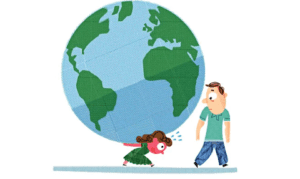“Fighting Climate Change” has been the buzz phrase of every environmentalist for decades. However, this narrative is one that should change, or better yet, be coupled with a new phrase: “Accept Climate Change.” Before the wokest of the woke cancel me, let me reframe this: Environmentalists must change the trajectory of their work not only to mitigate but also implement infrastructure that allows humans to live with the effects of their self-made shitshow. There is a falsely optimistic narrative injected into the mainstream media telling that we can stop this climate crisis in its tracks maybe if we all just recycle a bit more or only use bamboo straws. As if we as consumers buy into that, the Earth will not be able to just spring back to what it used to be pre-Industrial Revolution. This optimistic thought is a long-gone pipedream and one that was lost decades ago due to inaction from governments and private companies alike. Now is the time for governments to start working together to understand just how bad the future will be, and how humans will be able to live in a radically unstable climate.
Blaming Big Oil or China has been the prerogative for people who sit idly as the planet burns. It is easy to do, but it’s not doing any good. As people who care, we need to set aside our moral pride and accept that we, as a collective, created the mess. We don’t hear enough of this in this world, as blame is constantly thrown to the “other side.” The purest form of taking responsibility is to understand the mess humans have made in the past couple of centuries. We must now understand it is our responsibility to recognize the necessary changes our world needs in order to stay afloat (literally).
Let’s look at science. Using the phrase “climate change” as a term is helpful but distances humans from what the actual effects of it are. No matter how big the bubble humans live in is, the effects of the climate crisis will hit all levels of society regardless. Rising sea levels, coral bleaching, and ice-free Arctic Seas may seem distant, but these things have true proximate human impact. For this reason, one example of infrastructure planning that needs to take place now is on our shorelines.
If climate change continues at the given rate, by the year 2100, 490 communities in the US will be chronically flooded. Cities such as Boston & Los Angeles are under this threat. Heavier rainfall will result in more frequent flooding, even in areas that typically do not have much precipitation. There are many new “green systems” that allow for humans to still live on coasts, such as bioretention gardens and bioswales, but they are readily being implemented. The issue lies in the fact that even with all this doom and gloom, we as a society are still given this carrot that we may be able to stop it and reverse the effects. This gullibility, however, will start to take a human toll if we do not start acting now.
Another aspect of climate change that is often overlooked is how it affects crop yield. As the planet warms, it creates conditions that are incompatible with crops that have previously been grown in the area for centuries. There has already been a shift in the food production of corn, wheat, and soy, as unpredictable weather dictates what farmers can grow and harvest. Basic human needs will not be met if these crop seasons continue to fail. This leaves room for great innovation, and poses the question, “How can we produce food when not relying on the planet?” Some work is being done in terms of crop protection, but no real solution has been found. The agricultural field is at the edge of disaster, but most environmentalists continue to focus on inconsequential activism.
Accepting climate change is not a radical, pessimistic approach… in fact, it may be quite the opposite. It is simply a realistic way to view what our world looks like at this moment. Taking into account that human nature will not change overnight, we must shift some of our focus from mitigation to engineering how to live on a precarious Earth. Once we accept this fact, I believe we can change the trajectory of humankind, just as our inaction and that of our previous generations did. I want my future children to be able to have children, and I believe that the only possible way for that to happen is to be realistic about what challenges we are faced with now, and how we will implement concrete infrastructure to live on a dying planet.
Featured image by: Chris LeBoutillier / Unsplash




